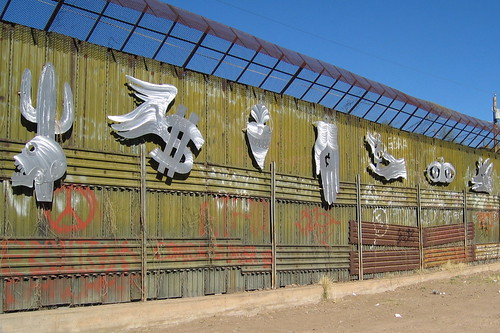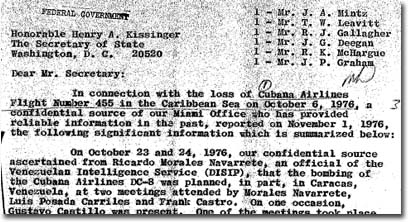 Here is an essential viewpoint very rarely, if ever, presented in the mainstream media regarding the immigration debate. You can also check a piece by (right-wing) columnist Andres Oppenheimer why the proposed border wall is a gigantic waste and deception.
Here is an essential viewpoint very rarely, if ever, presented in the mainstream media regarding the immigration debate. You can also check a piece by (right-wing) columnist Andres Oppenheimer why the proposed border wall is a gigantic waste and deception. Labor demands of two world wars, NAFTA inequities drew workers across border
By ERICA DAHL-BREDINE
National Catholic Reporter, September 22, 2006
As Congress considers building a 300-mile wall on the U.S.-Mexico border to “protect” us from the country that is also our second-largest trading partner, history reminds us that we share much of the responsibility for today’s immigration flows.
The advocates of more restrictive immigration laws often argue that Mexico is exporting its poverty to the United States, saying that Mexico should not look to us to solve its economic problems. The reality is, however, that inconsistent immigration policies over the past century combined with significant U.S. involvement in shaping Mexico’s economic policies have much to do with the current immigration crisis.
In the late 1880s, U.S. employers began recruiting workers from Mexico to fuel the growth of the railroad, agriculture and mining industries. A government worker recruitment program was established in 1914 to respond to the labor shortages during World War I. With the onset of the Great Depression, huge numbers of Mexican workers were deported, only to be recruited again in 1942, this time in response to the labor needs created by World War II.
A century of these immigration patterns has created deeply rooted family and social networks that have continued to attract more migrants from Mexico over the years. This dynamic has taken on a life of its own, one that cannot be simply brought to an end, nor is it ultimately in our own best interest to do so.
As we continue to invest more and more resources in an effort to keep migrants out, the pull factors on this side of the border have not subsided. The Department of Labor is projecting a significant labor shortage over the next 10 years. Meanwhile, leaders of key industries, including construction, meatpacking, agriculture, hotels and restaurants, speak frankly about their dependence on immigrant labor, much of it undocumented.
To be sure, Mexico bears great responsibility for failing to create jobs that would provide alternatives to migration. Instead, it has eliminated vital support programs for family farmers, failed to design a coherent industrial development policy and been unsuccessful in curbing widespread corruption.
However, over the last 25 years, the United States has helped shape Mexico’s economic policies -- policies that benefited some within Mexico but ultimately contributed to deeper and more widespread impoverishment. In 1982, for example, Mexico experienced a devastating debt crisis made worse by falling oil prices. The International Monetary Fund and World Bank, in which the United States plays a major role, helped design an economic recovery plan that required Mexico to dramatically slash public spending, privatize state enterprises and lower barriers to foreign trade. The results were a drop in health and other living standards, increased unemployment, a steady decline in real wages and growing poverty and inequality. After the peso crash of 1994, the United States helped broker a bailout package that resulted in skyrocketing interest rates in Mexico, leading to a deep recession and increased migration rates northward.
Mexico is paying a heavy price for that bailout today. In rescuing private banks and investors, Mexican taxpayers were burdened with a debt that equaled more than 11 percent of the country’s gross domestic product by 2004, diverting precious resources away from investment in education, health care and job creation.
Also in 1994, NAFTA brought the promise that free trade would allow Mexico to export goods instead of people. Unfortunately, that has not happened. A 2004 report by the Carnegie Endowment for International Peace found that at least 1.3 million Mexican agricultural jobs have been lost, while well-paying jobs in domestic manufacturing have disappeared. Overall, Mexico’s growth rate under NAFTA has been just half of what is needed to generate enough jobs for its growing labor force, according to the Economic Policy Institute. Real wages are lower today in Mexico than when NAFTA began, and the percentage of Mexicans living in poverty is higher than it was in the late 1970s.
Unlike other economic integration models, NAFTA did not consider the existing disparities between Mexico and the United States. The European Union, for example, established development funding for its poorer member countries prior to including them in the trading block. This was done to establish a more level playing field in the region and reduce the possibility of widespread displacement of workers and farmers in the poorer countries. When NAFTA came into effect, tens of thousands of Mexican businesses were simply unable to compete with U.S. companies and collapsed. Similarly, small farmers in Mexico were severely undercut by cheap, highly subsidized grain imports from the United States.
Unlike NAFTA, the European Union also allowed for labor mobility, recognizing that increased flows of capital and goods across borders also brings greater streams of people and workers. Rather than building walls and militarized zones to keep workers out, it incorporated plans to provide for safe, regulated flows of EU member migrant workers across borders. On the U.S.-Mexico border, in contrast, well over 3,000 migrants are reported to have died in the attempt to find a job in the United States since NAFTA came into effect. The actual number is likely to be much higher since many border crossing deaths go unreported.
The lessons from 12 years of economic integration and migrant deaths are clear: We cannot continue to reap the benefits of increased trade with Mexico while ignoring the social costs of building an integrated regional economy. The benefits and the costs of that integration must be shared by both countries.
Erica Dahl-Bredine is the Mexico Country Program Manager for Catholic Relief Services.











